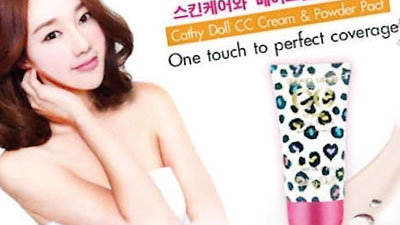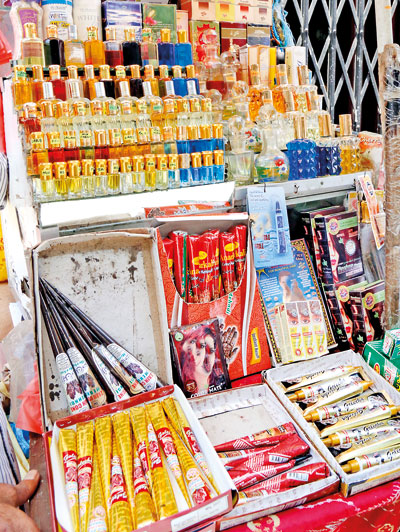News
Beauty and the beast
Despite the proliferation of cosmetics and skin care products containing dangerous levels of heavy metals such as mercury, lead, and arsenic, and rising numbers of women seeking medical help, there is barely any regulation, enforcement or legal cover, experts say.

Suitcase traders are hauling in counterfeit cosmetics from China, Thailand, Middle East, India, Pakistan, and South Korea into the country. Pix by M.A. Pushpa Kumara
Suitcase traders are hauling in counterfeit cosmetics from China, Thailand, Middle East, India, Pakistan, and South Korea into the country and flooding the market with untested, unregulated products. It is not unusual to find dozens of dubious Chinese and also Korean cosmetics targeting women in Sri Lanka.
Latest tests by the Industrial Technology Institute (ITI) have confirmed that despite the Sri Lankan standard for mercury in skin creams and lotions at 1 milligram per kilogram (1mg/kg, maximum allowable limit), some imported creams have a mercury content up to 25,000 milligrams per kilogram.
Senior deputy director (residue analysis laboratory) of ITI, M N A Mubarak told the Sunday Times, even researchers were shocked at the high levels of mercury in imported skin whitening creams.
“Out of 24 samples of imported and locally manufactured skin whitening/ bleaching creams, only 13 had mercury within the maximum permissible level and all of them were locally manufactured. All imported ones had high levels of mercury. There were two products that had 20,000 mg/kg of mercury, one product had up to 15,000 mg/kg, two products had 10,000-15,000 mg/kg and others between 5,000 and 10,000 mg/kg of mercury. This is an extremely high amount,” he said.But these products with such excess levels of heavy metals are being sold to women.
“When the Cosmetics, Devices and Drugs Regulatory Authority was active we used to get many samples for testing. For the past two years we have been getting fewer sample tests,” he said.
The floodgates for counterfeit cosmetics opened when the National Medicines Regulatory Authority Act No 05 of 2015 came into being replacing the Cosmetics, Devices and Drug Regulatory Authority Act.
Previously, cosmetics regulation came exclusively under the Cosmetics, Devices and Drugs Regulatory Authority and inspections, raiding and legal action was taken under the Cosmetics, Devices and Drug Regulatory Authority Act. The Act was later repealed and replaced with the National Medicines Regulatory Authority Act, promulgated to mainly regulate the manufacture, import and sale of medicinal drugs.
Drug inspectors, food and drug inspectors, and public health inspectors say they do not raid or inspect as the repealed Cosmetics, Devices and Drug Regulatory Authority Act had a clear definition on cosmetics.
“We used to raid and inspect beauty salons, did random baggage checking, did surprise raids on street vendors and inspected shops selling skin care products. But now we are reluctant as the Act does not clearly define the term cosmetics and the action to be taken against wrongdoers,” a drug inspector said.
“Fake, substandard cosmetics are brought in baggage from China, Thailand, the Middle East, India and Pakistan, with some sold physically and some through social media platforms. Apart from skin creams, there are cosmetic counterfeits of branded lip sticks, nail polish and eye liners. They need to be tested for quality. But we are still awaiting a regulatory body to deal with cosmetics,” he said.
In the absence Health Ministry regulation, the Consumer Affairs Authority moved last week to regulate skin whitening/bleaching creams.
A gazette notice was issued by the authority on May 1, stating the permissible maximum limits for heavy metals in skin creams in accordance with ISO standards as specified in SLS 743 by the Sri Lanka Standard Institution.
According to the notice, the permissible maximum limit of mercury is 1mg per kilo. Lead 10 mg/kg, arsenic 3mg/kg and cadmium 3mg/kg in makeup creams and lotions, cleansing, moisturizing creams, hair removal, sun screen, whitening, cold, vanishing creams, and lotions. Manufacturers and importers have been given time until November 1, this year to comply.
It has also been made compulsory that all manufacturers, importers, packers, distributors, or traders of skin creams and lotions should mark the name of product, name and address of the manufacturer, name and address of the importer or distributor in Sri Lanka, country of manufacture, brand name, volume/weight, batch or code or lot identification number, date of manufacture, expiry date or best before date, maximum retail price, list of ingredients, instruction for use and warning statements.
If the pack sizes are small, it is compulsory to attach a leaflet containing all the above details.
D Jeevanandan, director general of the authority, said the notice was issued following complaints from consumers and the rising number of products in the market.
He said the authority will get the support of the Ministry of Health, and investigations will begin. Legal action will be taken following the relief period.
Dr Janaka Akarawita, consultant dermatologist at the National Hospital in Colombo, said long-term exposure to potent heavy metals such as mercury can result in the body absorbing them and causing damage to organs such as the kidneys, the nervous system, blood cells, and if pregnant, the embryo will be affected by the exposure.
According to him, although there will be immediate results with skin whitening creams, long-term use can also change the colour of the skin, triggering small bumps on the outer skin that can turn into skin cancer with time.
“We get patients with skin reactions following usage of sub-standard face creams such as dilated blood vessels due to skin thinning (visible veins), skin redness, itchy skin, black spots. Some even do not know the name of the products they have used,” Dr Akarawita said.
Dr Nayana Perera, consultant dermatologist at the Colombo South Teaching Hospital (Kalubowila) noted complaints on allergies caused by bleaching/ lightening creams.
“We are getting more complaints from Colombo and suburbs and Negombo. Some creams contain mercury and steroids (corticosteroids) in high doses. More women tend to believe their neighbourhood beauty salon owners who are often coaxed by cosmetic importers. Beauty parlours should be monitored regularly,” she said.
Among frequent complaints are increased acne, pigmentation problems, skin irritation.
Director of the National Poison Centre, Dr Asanka Ratnayake, said they receive inquiries from the public about skin whitening creams and contents.
Beautician Ramani Fernando, said cosmetics brought in baggage are a growing concern and should be controlled.
“Cosmetics should be given priority similar to medicine. Whitening creams, are reaching the rural populations and if there are no inspections and raids, as well as awareness, many women will suffer from [adverse] health effects. Most substandard cosmetic importers and dealers approach owners of beauty salons,” she said.
Chief executive of the National Medicines Regulatory Authority, Dr Kamal Jayasinghe, said when the CDDA was repealed and replaced with the NMRA, it was initially decided to remove cosmetics from National Medicinal Regulatory Authority and establish a separate authority to handle cosmetics.
“The Cabinet later decided not to establish a separate authority but advised the Health Ministry to add clauses relating to cosmetics that were included in the repealed CDDA Act,” he said adding that the legal department of the Health Ministry is in the final stages of compiling regulations to be presented to the Cabinet. Once approved the NMRA will act as the regulatory body handling issues related to cosmetics.

